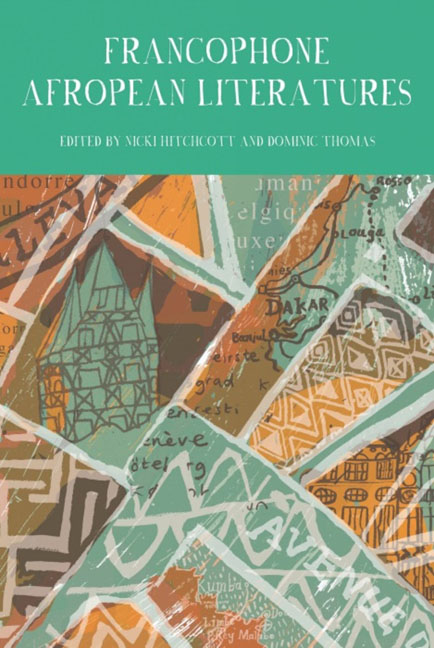Book contents
- Frontmatter
- Contents
- Introduction: Francophone Afropeans
- Essays
- Afropeanism and Francophone Sub-saharan African Writing
- The Transatlantic Poetics of Fatou Diome
- Corps Sans Titre: ‘Fleshiness’ and Afropean Identity in Bessora's 53 Cm
- Already Here: Sami Tchak's Afropean Generation
- Paris Polar: Afropean Noir in the City of Light
- Mapping Afropea: The Translation of Black Paris in the Fiction of Alain Mabanckou
- Relighting Stars and Bazaars of Voices: Exchange and Dialogue in Leonora Mianos Tels Des astres eteints and Alain Mabanckous Black Bazar
- Sex and the Afropean City: Léonora Miano's Blues Pour Élise
- Towards an Afropean Cosmopolitanism: Hospitality, Friendship and the African Immigrant
- Afropean Masculinities as bricolage
- Short Stories
- Notes on Contributors
- Index
Relighting Stars and Bazaars of Voices: Exchange and Dialogue in Leonora Mianos Tels Des astres eteints and Alain Mabanckous Black Bazar
from Essays
- Frontmatter
- Contents
- Introduction: Francophone Afropeans
- Essays
- Afropeanism and Francophone Sub-saharan African Writing
- The Transatlantic Poetics of Fatou Diome
- Corps Sans Titre: ‘Fleshiness’ and Afropean Identity in Bessora's 53 Cm
- Already Here: Sami Tchak's Afropean Generation
- Paris Polar: Afropean Noir in the City of Light
- Mapping Afropea: The Translation of Black Paris in the Fiction of Alain Mabanckou
- Relighting Stars and Bazaars of Voices: Exchange and Dialogue in Leonora Mianos Tels Des astres eteints and Alain Mabanckous Black Bazar
- Sex and the Afropean City: Léonora Miano's Blues Pour Élise
- Towards an Afropean Cosmopolitanism: Hospitality, Friendship and the African Immigrant
- Afropean Masculinities as bricolage
- Short Stories
- Notes on Contributors
- Index
Summary
L#x00E9;onora Miano's Tels des astres éteints [Like Extinguished Stars] (2008) and Alain Mabanckou's Black Bazar (2009) are complex works to consider in terms of theoretical frameworks, as these novels actively challenge attempts to situate them in any one place. The two books feature young, cosmopolitan characters of African heritage leading their lives in Paris and openly arguing with each other about where and how they want to live and what their lives mean to them. Miano's characters explore their varying relationships to Africa, while Mabanckou's first–person narrator recounts the many conversations and adventures he has had with his friends in a local bar. By making these exchanges central to the progression of the works, the authors do not promote any single vision of the lives led by Africans who have settled in France. They instead emphasize the existence of a range of valid and logical possibilities as they explore the richness of what this study aims to identify as the Afropean community.
I identify a refusal to pin down one overarching ideology or message not as a critique but rather as a means to shift attention towards the processes undertaken by the characters in their quest to find their places in their new homes. Indeed, Miano's and Mabanckou's novels begin with the premise that the characters feel somehow stuck: they have reached an impasse in their lives, as they are now in their early or mid–thirties and have realized that their current situations no longer satisfy them. They feel ill at ease for various reasons and must decide what they are going to do to improve their respective situations. The books thus chronicle what happens to characters as they seek answers to the questions they are asking themselves. Even though they disagree on the nature of the challenges they face and the solutions they hope to find, they all recognize that something must change if they want to lead settled, fulfilled lives.
Using this deciding moment in the characters’ lives as a foundation, this chapter will argue that Miano's and Mabanckou's contributions to the concept of Afropean identities and literatures stem precisely from their exploration of the range of topics their characters debate over the course of the novels.
- Type
- Chapter
- Information
- Francophone Afropean Literatures , pp. 110 - 123Publisher: Liverpool University PressPrint publication year: 2014



